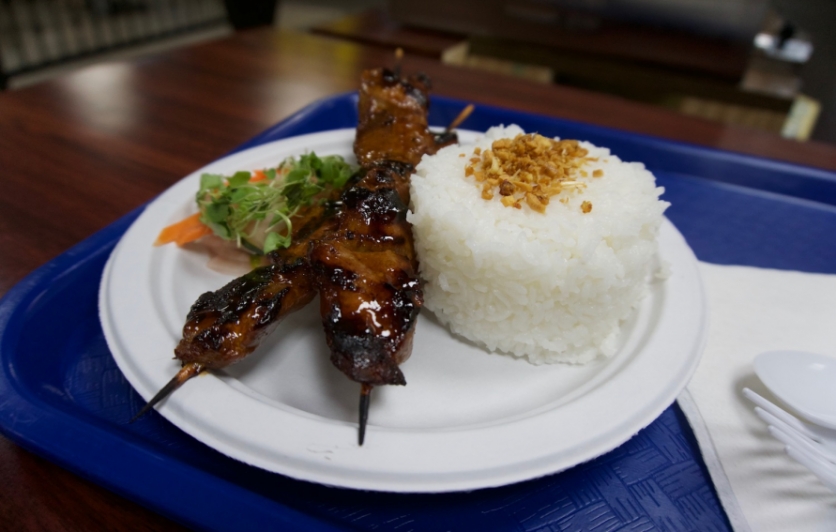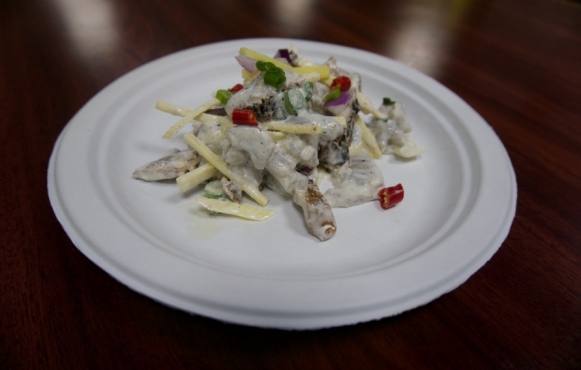Serving Up Filipino Fare in Hard Times

When Prince Torres arrived at his restaurant Filipino BBQ on the morning of March 13, he was prepared for uncertainty. To calm his nerves, he cleaned every inch of the kitchen floor and counter. “Being clean is important for a food court restaurant,” Prince said as he wiped. “The customer can see everything here.”
The menu at Filipino BBQ is small, specializing in Filipino street food like grilled pork and chicken skewers, all lacquered with a sticky house-made BBQ sauce laced with banana ketchup. A Filipino specialty, banana ketchup is the sweeter, slightly spicier twin of the common tomato ketchup. And despite its bright red color, it’s made entirely of bananas.
“I only use half the grill. The other half I leave off, to save gas. Every bit counts right now,” Prince said as he grilled a long slab of thin pork belly for sisig, a hash-like dish made with a textural blend of meat, skin and the crunch of diced pigs ears.
Filipino BBQ is located in the Hong Kong Food Court, a nondescript building next to a Chinese supermarket and Moore Homestead Playground in Elmhurst, Queens. Like other Asian food courts in Queens, the Hong Kong Food Court is filled with family-owned restaurants, the majority of them Chinese. But the Hong Kong Food Court is unique. Here, there’s a distinctly Southeast Asian flair. Filipino BBQ, with its brilliant white sign, is the only Filipino food court restaurant in Queens.
“I didn’t know it was going to be this hard,” Prince sighed. When the restaurant first opened in January, business was good. An experienced chef and graduate of the Institute of Culinary Education, Prince was the sous chef at Great Northern Food Hall in Grand Central Station before he opened Filipino BBQ with three business partners. He hoped to capitalize on the lack of Filipino restaurants in Elmhurst.
But business dropped dramatically in February. A lack of signage on the building caused pedestrians to stroll past the seemingly empty structure. Prince, along with other vendors, protested almost every day to the food court manager for better marketing. Things never changed. Then the coronavirus hit New York.
What is Filipino cuisine? It’s a complex question. Filipino cuisine is so diverse that during the menu planning, Prince himself was introduced to new dishes by his restaurant partners. He tried pork intestine for the first time, charred crispy on the grill with a soft and slightly gamey aftertaste. A weekend special is sinuglaw, a ceviche made with raw kingfish, grilled pork belly and herbs, all mixed with a dressing of mayonnaise, calamansi juice and explosive red chilies.
The popularity of Southeast Asian food is undeniable in America, evidenced by the multitude of Thai and Vietnamese restaurants. Despite that popularity, Filipino cuisine remains underappreciated.
“We Filipinos have been ashamed of our food,” Prince said. Because of a complex history of colonialism by Spain and the United States along with centuries of Chinese influence, the Filipino identity is intermixed. Many Filipinos feel a sense of inferiority with their food, often stating that other cuisines are more refined. However, this sentiment is changing as young Filipino American chefs like Prince are attempting to expand their heritage cuisine into the mainstream.
Prince isn’t sure about the future of Filipino BBQ, whether it can survive in the current environment of upheaval due to the coronavirus. Prince and his partners had planned on expanding to the Queens Night Market, but that’s all been delayed now as a series of unprecedented events have sent the New York restaurant industry into an unknown future.
But Prince remains optimistic. “I want to keep the restaurant open. And I’ll continue to look for other opportunities. I believe in Filipino cuisine and us Filipinos should be proud of our food.”






